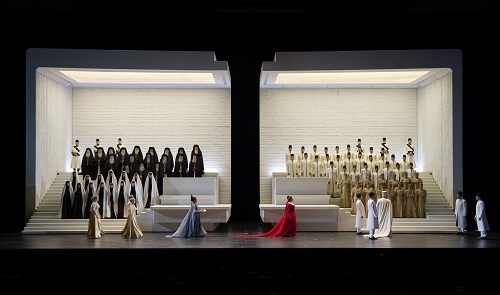What, for Verdi, was the bedrock of drama? Clashing personalities, yes, but also atmosphere, an element we too easily take for granted. Watching Aida as filmed at the 2017 Salzburg Festival, you won’t make that mistake. From the opening pianissimo of the divided first violins, shimmering like a mirage over hot desert sands, the music transports you to another time, place, and state of mind. No maestro knows better how to release Verdi’s evanescent essences than Riccardo Muti, and with the Vienna Philharmonic at his fingertips, the orchestral dazzlements just keep coming, whether in blazing triumphal fanfares or in exotic bird calls on the starlit Nile, always in intimate relation to stirrings of the human heart.
The staging, however, barely rises to the level of opera in concert. Monumental but lifeless, it’s the handiwork of the prominent Iranian-born photographer and video artist Shirin Neshat, trying her hand at opera for the first time. By her own admission, she’s no connoisseur. Troubled by Verdi’s outsider fantasy of Egypt, Neshat puts the Pharaoh’s army into modern military uniform and converts the priests of Phthah to Eastern Orthodox. Occasionally, a projected video of motionless people who watch and wait appears on the side of a mammoth box of what looks to be poured concrete; occasionally, the box rotates, which makes an impression. Two ballet sequences feature the same all-male ensemble in sun-bleached cattle skulls and full ankle-length skirts, dancing interchangeable choreography that makes no sense in either context. If you were expecting elephants and chariots, forget it.

Apart from those swirling dervishes, the only one up there who really moves is the Aida of Anna Netrebko. In a powerful role debut as the Nubian princess enslaved incognito to the pharaoh’s daughter, the Russian superstar scuttles onstage through deep shadow, in politically suspect dark makeup and a towering braided coiffure, wafting acres of lilac silk.
Torn between love of an enemy general and love of her country, Netrebko’s heroine commands the space around her in the expansive gestures of the born tragedienne. As her dramatic predicament requires, she hides her thoughts behind a mask of enigmatic composure that slips only in soliloquy or in moments of extreme duress. Best of all, she exhibits the smoldering vocality of a bygone era, not flailing for the high notes, not scraping for the low notes, negotiating the hazardous break between registers as if it were not there. Among the principals, she’s in a league of her own.
Aida streams on Apple TV’s Carnegie Hall + channel
Matthew Gurewitsch writes about opera and classical music for AIR MAIL. He lives in Hawaii

